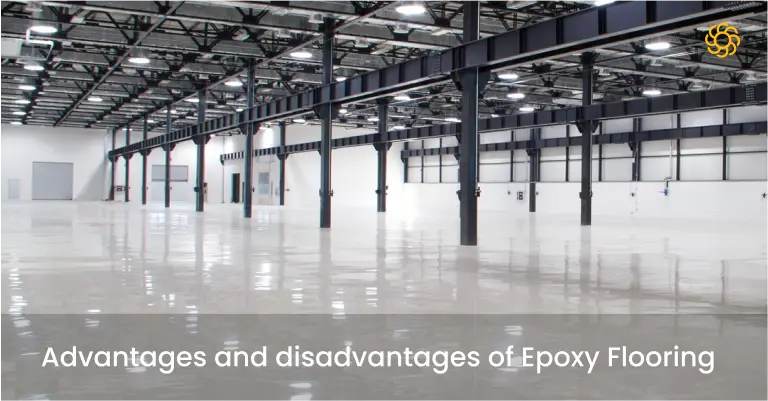Advantages and disadvantages of Epoxy Flooring
By: Brijesh
Last Updated: December 19, 2024

Explore the advantages and disadvantages of epoxy flooring, including its durability, low maintenance, chemical resistance, and challenges like slipperiness.
Table of Contents
In the recent times, epoxy flooring has become a popular choice for homeowners, businesses, and industries due to its exceptional durability, versatility, and aesthetic appeal. This type of flooring is made from a mixture of resin and hardener, which creates a strong and resistant surface. And, exactly like any other flooring option, epoxy flooring has its benefits and drawbacks. In this blog, we will delve into the advantages and disadvantages of epoxy flooring, exploring its durability, maintenance requirements, cost, and more. By understanding the pros and cons of epoxy flooring, you can make an informed decision about whether it's the right choice for your specific needs.
The advantages and disadvantages of epoxy flooring is listed below:
Advantages:
S. No. | Advantages | Context |
1 | Durability | Epoxy flooring is incredibly durable and can withstand heavy foot traffic, chemical spills, and mechanical stress. In an average and normal circumstances, It can last for 10-20 years or more with proper maintenance. |
2 | Chemical Resistance | Epoxy flooring provides excellent resistance to chemicals, including acids, alkalis, and solvents. This makes it an ideal solution for industrial and commercial spaces. |
3 | Low Maintenance | Epoxy flooring is easy to clean and maintain, reducing the need for frequent repairs and replacements. It can be cleaned with a mild detergent and water. |
4 | Aesthetics | Epoxy flooring is available in a wide range of colours and finishes, allowing you to customize the look and feel of your space. |
5 | Safety | Epoxy flooring provides excellent traction, reducing the risk of slips and falls. It can also be formulated to meet specific safety standards, such as anti-slip and anti-static. |
6 | Cost-Effective | Epoxy flooring is a cost-effective solution compared to other flooring options, such as ceramic tile or hardwood. It can also help reduce maintenance and repair costs in the long run. |
7 | Quick Installation | Epoxy flooring can be installed quickly, typically within 1-3 days, depending on the size of the area and the complexity of the installation. |
8 | Sustainable | Epoxy flooring is a sustainable option as it can be applied over existing flooring, reducing the need for costly and wasteful demolition and removal. |
9 | Customizable | Epoxy flooring can be customized to meet specific requirements, including colour, texture, and finish. |
10 | Warranty | Many epoxy flooring manufacturers offer warranties on their products, providing peace of mind and protection against defects. |
Disadvantages:
S. No. | Disadvantage | Context |
1 | Moisture Sensitivity | Epoxy flooring is sensitive to moisture, which can affect its adhesion and durability. It's essential to ensure that the surface is dry and free of moisture before installation. |
2 | UV Light Sensitivity | Epoxy flooring can be sensitive to UV light, which can cause it to yellow or discolor over time. This can be mitigated by using UV-resistant epoxy formulations. |
3 | Heat Sensitivity | Epoxy flooring can be sensitive to heat, which can cause it to soften or become discolored. This can be mitigated by using heat-resistant epoxy formulations. |
4 | Repair Challenges | While epoxy flooring is durable, it can be challenging to repair if damaged. It's essential to work with a qualified installer who can provide guidance on repair and maintenance. |
5 | Requires Proper Surface Preparation | Epoxy flooring requires proper surface preparation, including cleaning, grinding, and priming, to ensure a strong bond between the epoxy and the surface. |
6 | May Turn Yellow Over Time | Some epoxy flooring formulations may yellow over time due to exposure to UV light or other environmental factors. |
7 | Requires Specialized Installation | Epoxy flooring requires specialized installation, including the use of specialized equipment and techniques, to ensure a successful installation. |
Conclusion
In conclusion, epoxy flooring is a versatile and durable solution that offers numerous benefits, including exceptional durability, chemical resistance, and aesthetic appeal. However, it also has its drawbacks, such as high initial costs, sensitivity to UV light and heat, and repair challenges. By weighing the advantages and disadvantages of epoxy flooring, you can make an informed decision about whether it's the right choice for your specific needs. With proper installation, maintenance, and care, epoxy flooring can provide a long-lasting and high-performance surface that enhances the beauty and functionality of your space.


